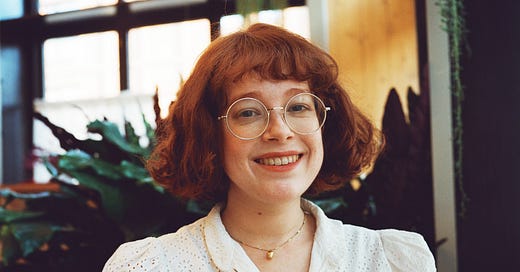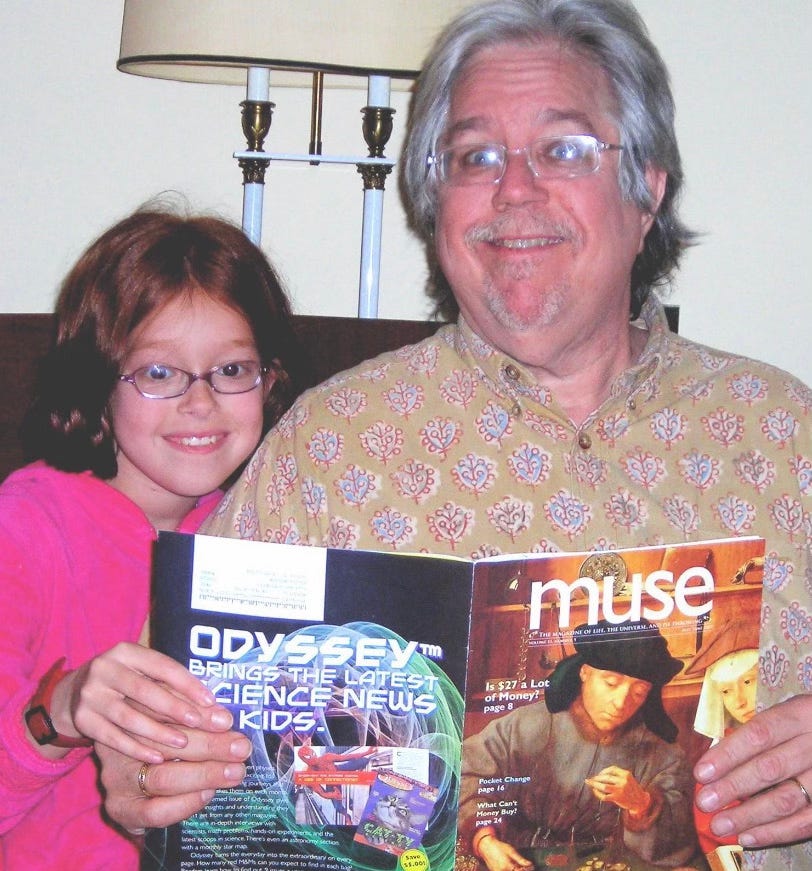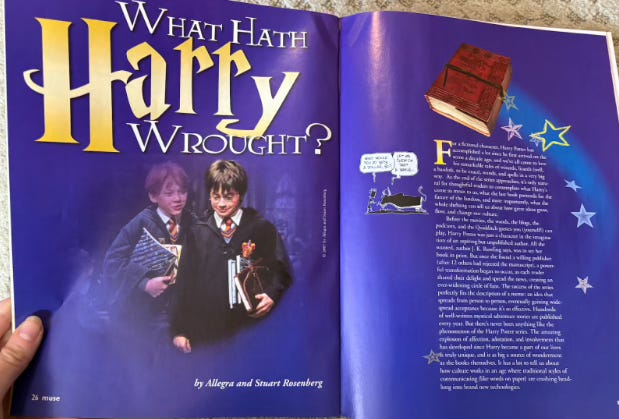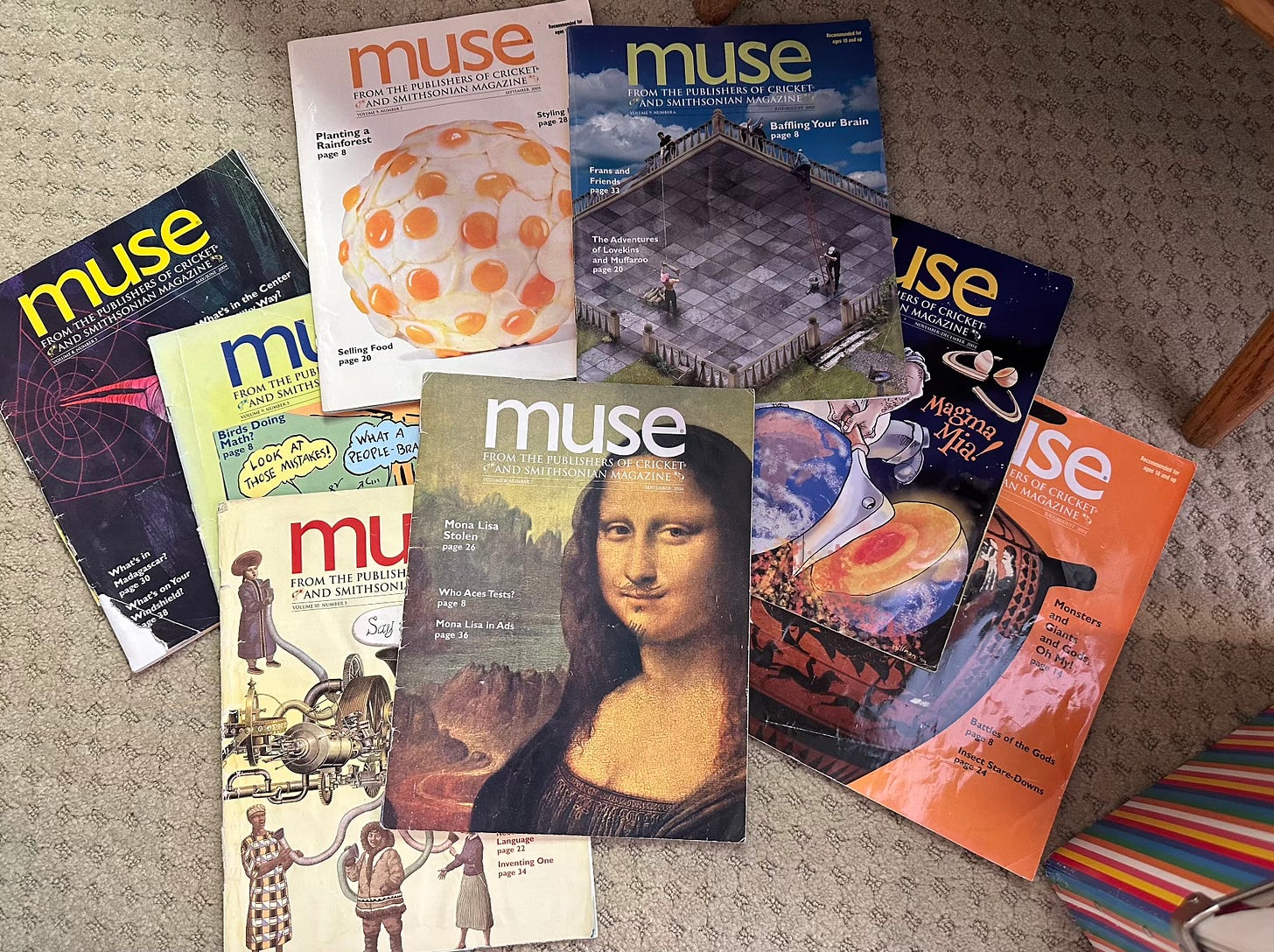What is your current job?
I just started a position as the new Community Editor at Atlas Obscura. For a year and change prior to that, I was a freelance writer with bylines in various outlets (National Geographic, WIRED, The Atlantic, Slate, Sherwood, Long Now) as well as working on my debut nonfiction book for W. W. Norton, a history of fan culture.
What was your first byline?
As a kid (c. 2003-2008) I was a devoted reader of Muse magazine, a nonfiction magazine for deeply nerdy children published by Carus Publishing, which was also the publisher behind the more well-known kids' lit mag Cricket. Muse was something totally unique: a hodgepodge of history, art, science, technology, geography and literature, plus cartoons by Larry Gonick (featuring a recurring cast of hilarious "Muses") and a thriving young readership which was visibly active on the letters page and in the submission contests at the back of each issue. The average reader seemed to be about 12 years old, read at a college level (or beyond), was obsessed with Lord of the Rings, Master & Commander, Greek myths or all 3, with a tendency towards Monty Python quotations and the kind of obsessive enthusiasm that probably got them weird looks at school.
Nothing was more exciting to me than a new issue of Muse arriving in the mail. Each month I'd learn a dozen brand new incredible things: theories of language acquisition — what happens beyond the event horizon of a black hole — how food in advertisements is photographed — the psychology of human prejudice — mathematical intelligence in animals — how optical illusions work — what's inside the Paris catacombs — how Vermeer painted his pictures — how mammoth bones influenced the Greek pantheon — you know, the usual.
The address printed in each issue for readers to send mail into was located in Chicago, where I happened to live. When I was about 10 I made it my mission to visit the office, and impress upon the editors my candidacy as a potential staff writer. Nevermind the fact that many of the articles were, in fact, excerpts from adult nonfiction books, and that's what made the magazine so excellent for kids like me. Armed with the kind of creative confidence instilled in me by my parents that has led to my subsequent baffling freelance career, I had them bring me to the downtown address listed — only to find that it was closed. (It may have been a weekend, now that I think about it.)
Presumably my mom called them up to arrange an official meeting (I can't remember but it seems like something she would do) and a little while later I (and my little brother, who didn't care about Muse and I probably actively tried to stop from coming) was the guest of editor Samantha Sordyl inside the hallowed halls of Carus Publishing. I was treated to pie—pies were the preferred weapon of Kokopelli, one of Gonick's main Muse characters—and I must have tried to impress on her my candidacy as a contributor. Shortly after that meeting, she left the company, but made sure to introduce us to her replacement, Romana Prokopiw, who ended up being my editor at Muse.
My mom at this point handed off to my dad, who had freelance writing experience and helped me craft a pitch for Romana. It was 2007 and the final Harry Potter book was on the horizon. As a major fan, I had Mugglenet as my homepage and knew that the site had been founded by quite young fans themselves, and they were about to go on tour to promote their HP companion books before the release of Deathly Hallows. Romana agreed that I, with my dad's help, should write an article for Muse about the upcoming release and the fan activity around it, and as part of that I could go interview (!!!) the Mugglenet creators at their book event.
We signed a contract for $2200 which in retrospect was probably an impressive $1/word and certainly the most I'd ever been paid for anything ever, being as I was 11 years old at that point. Interviewing Emerson Spartz & co from Mugglenet (my heroes at the time) was mildly terrifying but my dad was with me so I got through it OK. The writing process was a blur but I remember lots of typing in a Word document on my Mac and then calling my dad over so he could help rewrite it. Here is the picture we took for our author picture in the magazine:
It was a true collaboration. I remember really enjoying the editorial process and all the advice Romana had to give about how to improve the piece. My dad wrote little informational sidebars to go alongside the main text, which were a little more academic and informative than the main body, and the piece was published in all its print glory in the Summer 2007 issue, right around the book's release.
I remember being SO proud and happy. Something I wrote was in print—in MUSE MAGAZINE!!! The best magazine ever! Even as a child I was sorely lacking in follow-through and was a big dreamer, always thinking up projects I'd never even start, let alone complete—but here was something I really, actually did. I can't overstate how incredible and patient and supportive my dad was throughout the whole process. I'm sure most of the final piece was his work but I never felt like that at the time—I felt like it was mine, and ours.
My only regret is that we never embarked on a follow-up piece. We had an idea for it: we wanted to write about Henry Darger, and even attended an exhibit on him with Romana and started a draft. But my procrastination must've gotten the better of me, because it never fully got off the ground. Shortly after, Romana moved on, and by age 13 or so I'd grown out of Muse anyway and began reading my parents' copies of The New Yorker etc. Carus/Cricket Media was sold off in 2011 and Muse has continued publishing, although it was acquired by a VC firm (ugh) in 2016, underwent a major editorial and design revamp in 2020, and by all accounts is no longer the magazine it was—Gonick's Muses are gone, which renders the whole thing pointless, IMHO.
I have a thousand other tales I could tell about Muse, mostly related to the many, many friends I met (and have kept!) through its thriving online community circa '06-'07—but that is another story, if anyone out there wants to let me write it for them.
Mainly I'm grateful to Samantha, Romana, my mother, and my late father for being so patient and supportive of an aspiring writer. It was certainly not a straight line from writing for Muse to my current freelance endeavors—if it had been, I'd probably be a managing editor by now or something—but Muse is absolutely where it all started.
What was your first real job in journalism?
Technically it’s the one I have now! It took a hot second because, truthfully, I didn't decide to seriously try my hand at journalism until 4 years after I finished undergrad, after dilly-dallying around as a music manager, record label scout, graduate student, social media copywriter, comedy producer, and probably a dozen other random things. But prior to coming to Atlas, my "big break," aka the main thing that led to a domino effect of subsequent opportunities and connections, was my position as a weekly columnist for Ryan Broderick's Garbage Day newsletter beginning in 2022.
How did you get it?
My friend Sam Vilkins introduced me to Ryan's work and Garbage Day many many years ago—or at least that's how I think it went, I might have introduced it to her. Either way, she and I would chat about new issues often, agreeing that Ryan was one of the only journalists out there covering fandom topics in a sensitive and understanding way. However, when he got fandom stuff wrong I wouldn't hesitate to @ him with corrections on Twitter—this led to him following me back (this was back when verification, which I'd finagled somehow, meant the immediate establishment of trust between media strangers on Twitter) and eventually frequent DMs about fan stuff. When he posted that he was looking for guest articles I pitched him some ideas, and he (to my surprise) came back with the idea of me doing a regular column!
Muse aside, I'd only published a few pieces on obscure blogs and outlets before then—nothing major, and most of it was old music writing from college. But Ryan took a chance on me, was a really great editor and sounding board (and paid well!), and gave me the confidence to pitch other outlets with similar material and essentially restart my portfolio from scratch. I also connected to so many amazing people via the wider Garbage Day community, including Rusty Foster from Today in Tabs (where I also ended up running a column for a while) and the editor who matched me up with my beloved agent. THANK YOU RYAN!!!!!
What advice do you have for people looking to break into journalism?
Do as I say, not as I do! You probably want internships. I should have done internships. Or at the very least a journalism MA and not the vague, fun but wholly unemployable humanities MA I ended up doing. Without any full-time experience at my great age, and also without the kind of dedication + work ethic + sheer natural talent that could catapult me easily above the crab-in-bucket madness that is the journalism job market right now, it was genuinely very difficult to find a job.
Mere competence and desire sadly doesn't get you anywhere. Naturally I rue that it is not the 1980s and I can't make $2/word at a glossy mag without even having to be very good, but unfortunately at this point I don't really want to do anything other than write for the rest of my life so it was incumbent upon me to figure it out.
As far as what I've done right: I made friends!!! I moved to NYC in 2020 and almost immediately started going to events like Digital Void (run by Ryan and some of his friends) which is where I met many a journalist pal who helped me find my feet in the scene. For media/tech adjacent journalism, spots like Caveat and Wonderville are ideal places to meet cool people, not even for the craven purpose of "networking" but merely just to do that thing impossible in almost any other city in the country, which is to find out that a random stranger shares a huge proportion of your obscure cultural DNA and related interests.
People I met at events like this & through adjacent networks include Walt Hickey, who has been a dream to work with at Business Insider and Sherwood, and Luke Winkie, who helped me land my first pitch at Slate. Asking for things can be humiliating but that is essentially what journalism is. Pitching and interviewing are two different forms of asking for things, to say nothing of invoicing. If your network is small, ask the people in it for help making it bigger. Referrals, referrals, referrals. After working with Rusty Foster from Tabs for a while he referred me to Ben Jackson, who I worked with as a contractor and then—vitally—hired him as the job coach who helped me score an interview at Atlas Obscura. I wouldn't have met Ben without Rusty, Rusty without Ryan, and I wouldn't have met Ryan without Sam, and I wouldn't have met Sam without making a Tumblr in 2010 to follow accounts like davidtennantseyebrows.tumblr.com.
As my dad would say, "It's a small world—but I wouldn't wanna paint it!"
Find Allegra on her website, her Substack, BlueSky and LinkedIn.









